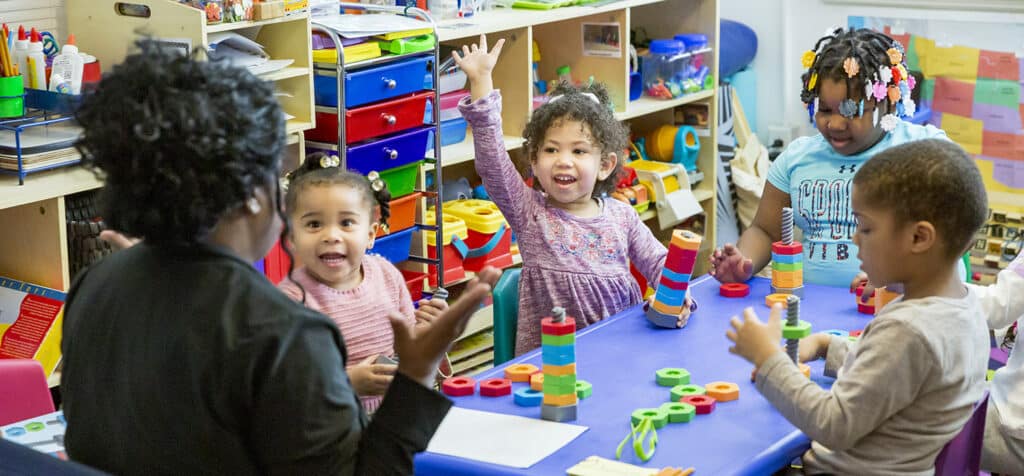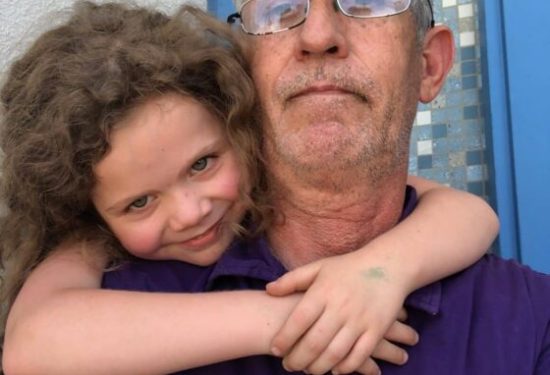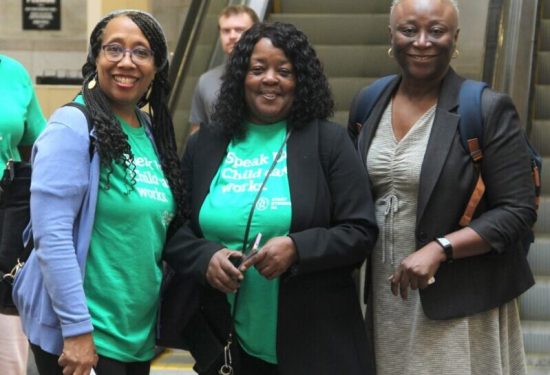More than a decade ago I visited a licensed Family Child Care (FCC) program deep in the heart of North Philadelphia. Not far from Temple University’s campus, the program was set up in the basement of what once was a row home, but stood alone as the attached houses on either side had been demolished. I was there to meet the owner and operator of this child care program, Sylvia, to support her in preparing her paperwork to be recognized in our state’s quality system.
When I stepped into the basement of Sylvia’s home, I was immediately transported to the most intentionally structured play space. The area was brightly lit and Sylvia had chosen to divide the space by learning areas. Each learning area was full of labeled materials within reach of children. Though there were plenty of learning materials to choose from, they were presented in a way that wasn’t overwhelming. Many of the materials were Montessori inspired. Syliva later explained that she had been an assistant teacher in a Montessori school before opening her family child care program. As I watched children move around the space, it was clear that they understood the routine and knew how to use the materials. The children were full of energy and joyful, but on task and purposeful.
Sylvia told me all about her program, working with her daughters, her Montessori background, and the intentional renovations she made to her home to maximize the learning area. She showed me her lesson planning book and explained how she made decisions about which materials to introduce. She described how she individualized her plans to support the abilities of the children in her program and most impressively, she showed me her system for documenting child observations, which she would later use to compile developmental progress reports for each child. I will admit that documenting observations for each child while facilitating instruction was a task that I struggled with as a teacher and had never felt I quite mastered. If I had known Sylvia when I was a preschool teacher, my child assessment practices would have improved remarkably. I remember leaving Sylvia’s home that day, knowing I had seen something special, quietly tucked away in a familiar and otherwise unremarkable neighborhood. Most people walking by that house had no idea of the learning that was going on inside. This home-based program was a treasure; I maintained my relationship with Sylvia for many years and it was truly my pleasure to watch her work.
She and I were never able to compile the documents she needed for the state’s quality program. Sylvia’s priority was the daily experience of the children in her program. After she prepared meals, supervised staff, wrote lesson plans, cleaned the learning space, documented observations, greeted families and selected new materials to support learning, there wasn’t much time left at the end of Sylvia’s day to complete the administrative paperwork required by the early learning quality system. Like all of the home-based providers we work with, Sylvia understood the trade offs: More funding often came with more administrative work and she decided not to prioritize the system paperwork over the child and parent experience. As a home-based provider who likely worked more than 40 hours a week, Sylvia focused her energy on pedagogical excellence, attentive assessment and creating the best learning environment. Sylvia made a choice not to spend her time jumping through the administrative hoops the system expected of her. While I deeply respect the decision Sylvia made, I recognize that she lost out on additional funding and more importantly, our system lost out on the opportunity to celebrate, compensate and learn from her.
Sylvia’s story informs my work at Home Grown, where we are focused on ensuring the inclusion of FCC in well-paying, well supported programs like state- and city-funded pre-K. We know FCC providers contribute enormously to child development and learning. Yet, a recent study by NIEER illustrated that while about 24 states and five cities allow home-based providers to participate in their pre-K programs, fewer than 1% of providers in most pre-K systems were family child care providers (FCC), the licensed form of home-based child care. Home-based child care is where some of our most underserved and hard-to-reach children and families are receiving services, including families and providers of color, those in rural communities, those who speak languages other than English, and those who work nontraditional hours. The FCC providers serving these families often share the same culture and language and reside in the same communities as the children in their care. Exclusion of these providers from the formal pre-K system is a loss for the system and further marginalizes the families and providers who need system resources. Systems that include FCC providers may be better able to achieve their goals around equity and inclusion and meeting the needs of the hardest to reach families. FCC providers like Sylvia can inform better practices and improve pre-K systems overall.
Our work in this area is grounded in a set of key principles that assert the fact that high-quality pre-K can be successfully delivered in home-based settings and that this is a first choice setting for many diverse families. For systems to do this well, they need to recognize and remediate the decades of disinvestment and inequitable policies toward these providers and the families they serve. Providers and families need to drive the design and oversight of pre-K programs to ensure these programs meet their needs, build support for their strengths, and do not undermine existing services (to infants and toddlers and during nontraditional hours).
We are excited to partner with NIEER and Erikson to bring meaningful policy and practice tools to the field to pave the way for more inclusion of FCC in pre-K. While these groups bring different perspectives and engage different audiences, they each offer important contributions to support the many system leaders who will be necessary to make bold change to achieve an inclusive and equitable system. Each team, though working on separate projects, collaborates with Home Grown to reflect these guiding principles and center provider voice and input from the field in their work.
View our current and upcoming products:


- PreK in Family Child Care Project (PKFCC) Website
- A Transformative Vision for the Authentic Inclusion of Family Child Care in Mixed-Delivery PreK Systems Brief
- Strategies Toward the Equitable Implementation of PreK in Family Child Care: Qualifications and Compensation Qualifications and Compensation Brief
- Strategies Toward the Equitable Implementation of PreK in Family Child Care: Curriculum, Assessment, Developmental Screening, and Monitoring Brief




